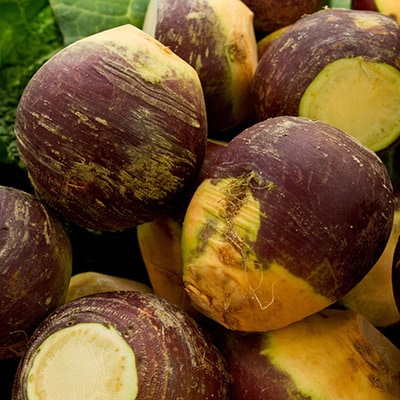Rutabagas are also known as swedes, Swedish turnip, wax turnip, or neep.
Background
- Rutabaga is a member of the Brassicaceae botanical family which includes a variety of vegetables such as arugula, bok choy, broccoli, cabbage, kale, radish, and turnip.
- Rutabagas are a cross between a turnip and wild cabbage and are believed to have originated in Russia or Scandinavia.
Nutrition
- Rutabagas are an excellent source of vitamin C and a good source of fiber, magnesium, phosphorus, potassium, and manganese.
- Vitamin C is an antioxidant which supports wound healing, immune function and collagen, and connective tissue formation.
- Fiber promotes digestive health by normalizing bowel movements. It also helps to lower cholesterol levels and control blood sugar levels.
- Magnesium has many functions including blood pressure and blood sugar regulation, bone formation, hormone secretion, and nervous system function.
- Phosphorus aids in bone formation, energy production and storage, and hormone activation.
- Potassium benefits blood pressure regulation, fluid balance, heart function, and muscle contraction.
- Manganese assists in wound healing, cartilage and bone formation as well as carbohydrate, protein, and cholesterol metabolism.
How to Purchase, Prepare, and Store
- Purchase rutabagas at your local grocery store or during the fall at a farmers market.
- Choose medium sized rutabagas that are firm and heavy for their size. Avoid those with blemishes or soft spots.
- Rutabagas may have a waxy coating which increases their shelf life. Remove wax with a vegetable peeler or paring knife.
- Prepare by washing the outside of the rutabaga prior to peeling. Cut a slice off the bottom to create a flat surface then carefully cut into slabs, slices, cubes, or as indicated by your recipe.
- Store in a cool, dry place such as a root cellar for up to several weeks. If you do not have a cool, dry place, store unwashed rutabagas in an unsealed plastic bag in the refrigerator.
- Prepare by roasting, baking, mashing, boiling, or steaming. Add rutabaga to a stir fry, soup or stew. Use raw in salad or coleslaw recipes.
Nutrition Facts
1 cup cubed rutabagas, cooked, boiled
- Calories: 51
- Protein: 1.58 g
- Fat: 0.306 g
- Carbohydrate: 11.6 g
- Fiber: 3.06 g
- Calcium: 30.6 mg
- Iron: 0.306 mg
- Magnesium: 17.0 mg
- Phosphorus: 69.7 mg
- Folate: 25.5 µg
- Vitamin A: 0.0 µg
Source: fdc.nal.usda.gov
Recipes
Request an Appointment
